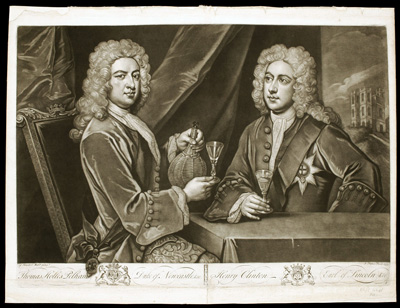The Secretaries of State

The Secretaries of State were ministers appointed by the Crown and First Minister to manage foreign affairs in the eighteenth-century British government. As senior members of the inner Cabinet, their influence was frequently decisive in shaping colonial policies and choosing who would enact them. Until 1768, the Secretary of State for the Southern Department was responsible for American colonial affairs and almost all official colonial orders were issued in his name on behalf of the King. He was also responsible for some domestic affairs, as well as for diplomatic relations with France, Spain, Switzerland, Italy, Portugal, the Ottoman Empire, and Ireland.
The long term in office (1724-48) of Thomas Pelham-Holles, Duke of Newcastle, has led to debate among historians about whether his apparent ignorance of colonial policy in favor of using America as a source of personal patronage represented an era of, in Edmund Burke's oft-used term, "salutary neglect" for the colonies. Recent scholarship suggests that such a view is an exaggeration of Newcastle's poor performance. Moreover, it is too narrow an understanding of the role of the office and Newcastle's attention to its other, more pressing, aspects. Many imperial officials had a hand in deciding various aspects of colonial policies in the period, from the First Minister to the Lords of the Admiralty to Parliament, and they were especially active with such measures as establishing Georgia and passing the first Molasses Act. Furthermore, Newcastle's responsibility for diplomatic relations with southern Europe included France and Spain, with both of which Britain was at war for much of his tenure.
For the next 20 years following Newcastle's term, the office was something of a revolving door. During this period 11 different men held the position, including William Pitt who used the post to direct British conduct of the Seven Years War. The job was especially fluid after the accession of George III in 1760, when six men, such as the Earl of Halifax and Henry Seymour Conway, went through it in only eight years.
Serious concerns about deteriorating relations in America led to the creation in 1768 of a new Secretary of State for the Colonies. It was first held by an Anglo-Irishman, Wills Hill, the Earl of Hillsborough (later 1st Marquess of Downshire), who was immediately faced with American dissension caused by the Townshend duties, the rampant expansion of frontier settlements, and the prospect of creating a workable government for French Catholic Quebec. The wind speed of colonial disaffection was considerably lessened when Parliament repealed all the Townshend Acts in March 1770, except for that on tea, which was retained as a symbol of parliamentary sovereignty. Maintaining peace on the frontier, restricting western settlement, and the trouble caused by a proposal to create a colony on the Ohio River proved more intractable, leading to Hillsborough's resignation in August 1772.
William Legge, Earl of Dartmouth, an especial favorite of Americans such as Benjamin Franklin, Samuel Adams, and John Randolph (who sent Dartmouth a pair of drakes in 1767 for his help in repealing the Stamp Act) succeeded Hillsborough. He inherited all the problems that bedeviled Hillsborough, along with the Gaspée incident, none of which were resolved when they were overshadowed in late January 1774 by news of the Boston Tea Party. Colonial policy thereafter was assumed by Parliament, which passed the Coercive Acts between February and June 1774. Dartmouth's only marked contribution to them was the introduction of the Quebec Act in May. Dartmouth, favoring conciliation with the Americans, lost all capacity to influence colonial affairs in April 1775 when armed conflict broke out at Lexington and Concord. Not willing to support a policy of suppression, he resigned in November 1775 to become Lord Privy Seal (remaining a member of the Cabinet).
Dartmouth was succeeded by George Sackville Germain, who inherited a vastly expanded position, one infused with new powers to conduct the war against America, such as authority to coordinate the efforts of the Admiralty, the Board of Ordnance, and the Treasury. Germain remained in the office, directing what became a global war with the United States and its European allies, until February 1782 when he became a casualty of Cornwallis's surrender at Yorktown the previous October.









